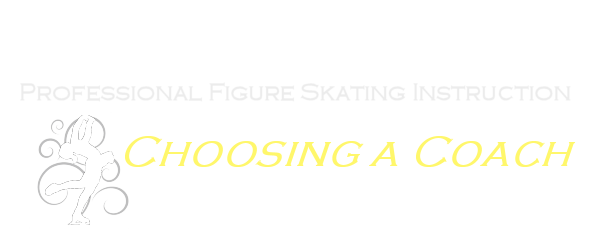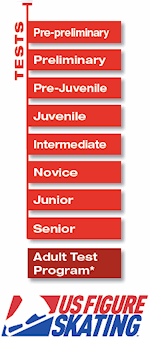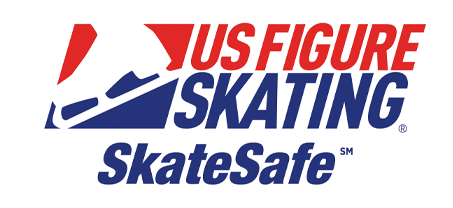Choosing a Coach
No single coach is a perfect fit for every student. Not only do students have differing interests, abilities, and personalities, they don't all learn the same way. An adult skater with recreational interests and little athletic experience processes ideas and information differently than a senior level teenager with Olympic aspirations. Someone working on triple jumps has dramatically divergent needs than someone learning the Canasta Tango in ice dance.

Figure skating coaches, of course, have widely varying degrees of knowledge and experience, all of which are important to understand when making a decision. Just as important as your coach's qualifications, however, is his or her style or method of teaching. Some teach by example, others by explanation, and others still through intimidation. The question is not so much "Which method is right?" as it is "Which method is right for me or my child?"
This is not intended to make the job of choosing a coach sound impossible, because it's not. The goal of this article is simply to encourage you to be diligent in making the choice and to provide some suggestions with respect to this effort.
Qualifications
Information about a given coach's personal achievements, education, and experience can provide valuable insight into their ability to provide quality instruction. However, this information can occasionally be misleading and therefore must be balanced with and against the other factors mentioned within the scope of this article.
Qualifications can be examined in a number of different ways. For our purposes here, I will use the following categories and definitions:
- Personal achievement - The coach's level of success in term of organized testing and competitions, plus any experience in professional shows.
- Education - The coach's academic background, as well as any continuing education they have had with respect to the figure skating profession.
- Experience - The coach's experience in terms of instruction, as measured in years or the level at which his or her students have participated, plus any related experience.
- Ratings - The coach's "rating" as an instructor, as determined by examination under a structured testing program.
A coach's level of Personal Achievement is an important indication of his or her knowledge and experience with respect to certain disciplines within the sport. Obviously, the higher the test a coach has passed, the more experience she has and the more likely it is she will have sufficient knowledge to coach a skater up to or beyond a given level. It is indeed rare to see a coach with only a Juvenile Free Skating test take a student through a Junior or Senior Free Skating test. That is not to say it can't be done, but it is far less likely.
For any skater, establishing the proper fundamentals in terms of technique is important to long-term success. In this respect, it is generally accepted that a coach who has passed higher tests is better suited to coach the more ambitious young skater, because their experience at higher levels enables them to build a stronger foundation for future growth. Again, on the surface this makes sense, but it is hardly an absolute. There are many low-test coaches who do a fine job preparing skaters for advancement to higher levels.
Whatever your interests or ambitions, don't be shy about asking a coach about his or her level of personal achievement, and if the answers you get seem vague, be cautious. A good coach will not be the least bit reluctant to provide you with a copy of his or her résumé or C.V.
Another element worth noting in the area of Personal Achievement is competitive experience. A skater with National, World or Olympic experience is certainly someone to be respected. Be cautious, however, of those who claim "gold medals" or other awards in lesser or even unknown competitions. Also, realize that a very, very small number of talented skaters actually make it to National, World and Olympic competition and that sometimes the difference between those who do and those who don't is one particularly great (or terrible) performance in competition.
More importantly, remember that being able to skate at a very high level, and being able to teach skating, are not one and the same thing. Some skaters are incredible performers, possessing the passion and ability to enthrall us with their grace and presence on the ice. Not all of those who perform well, however, have the knowledge, experience, ability, or desire to instruct. Skating is one set of skills; teaching another. The knowledge may be the same, but the way in which that knowledge is applied is very different. Look at the coaches of many of the top skaters in the World today; how many of them ever had actual experience themselves as a skater in top competitions? Some have, but many haven't. That's why Personal Achievement should never be applied as a litmus test in choosing a coach. It should be just one factor among many in your decision.
One final caution: Unfortunately, as with the job-seeking population at large, misstatement and exaggeration are not unheard of among the coaching ranks. The problem is exacerbated by the fact that many arenas and clubs fail to check their coaches' backgrounds or adequately vet their résumés. In some arenas, the employee handing out skates for the public session will have undergone a drug test and criminal background check to gain his or her position, while the coach who is spending time privately with your son or daughter has done little more than pass a simple interview and lace on a pair of skates. If in doubt, check with the arena or the local skating club to see what information they have. The skating associations themselves may also be able to provide some assistance in verifying credentials.
One of my personal hot buttons is Education. Education is important in virtually any endeavor, and skating is no exception. Of course, many coaches claim—and not without some degree of merit—that they received their education over many years on the ice as amateur competitors.
Better coaches, however, realize there are limitations to this type of education and recognize the need for more. An academic background in any one of a variety of disciplines can strongly complement and strengthen a coach's knowledge and his ability to apply that knowledge effectively. Given all of the responsibilities a coach has, who wouldn't benefit from further education in psychology, kinesiology, physics, sports medicine, nutrition, dance, music, weight training, finance, or even business law?
Moving beyond academics, there is the matter of continuing education in the sport. Organizations such as the Professional Skaters Association (PSA) offer conferences, symposiums, and seminars where coaches have a chance to learn from top professionals and experts from around the world. There are US Figure Skating schools for skating judges and technical specialists, which professionals are often invited to attend. At one of these, a coach may learn exactly what the judges are looking for, what the latest rule changes are, and other tips that will help their skaters excel on tests and in competition.
Most coaches, of course, are independent contractors, which means that they have no vacation or other benefits, and every hour, day or week they spend away from their students represents lost income. Consequently, the actual expense of attending conferences well exceeds the cost of admission. Ultimately, however, the dedicated professional recognizes that this is a cost of doing business—an investment if you will—and that the long-term benefits that accrue to their skaters and their business outweigh the cost.
What is the right amount of education? It depends. Coaches who want nothing more than to teach fundamentals in group class probably don't need to invest too much time or money in furthering their education, while coaches working with more serious and competitive youngsters should never stop trying to learn more. So again, don't be shy about asking a prospective coach about their continuing education.
Experience, of course, is a form of education. How long has the coach been an instructor? Are they full-time, part-time, or ???? What success have his or her students had?
There is no right or wrong number here. To use an extreme example, would you prefer a coach with (a) thirty years of experience who has never had a student pass her Juvenile Free Skating test, or (b) three years of experience and five students in the World Championships? Surprisingly enough, the answer isn't always obvious. It still may depend on what the goals are for you or your child.
Of course, even among the very best coaches in the sport, there isn't one who can claim to be an expert in every aspect of sport and athletics, no matter how great his or her experience or education. A good coach recognizes his or her limitations and develops resources to assist the skater in areas where his or her own time and expertise may be lacking — i.e., dance, fitness, sports medicine, etc..
Ratings are another valuable measure of a coach's knowledge and ability. The Professional Skaters' Association (PSA) has a comprehensive system of rating examinations for coaches. The PSA Rating System is intended for "professionals who want to validate their skating skill and teaching experience." The ratings are based on both written and oral exams. The oral exams are difficult and intimidating, as the coach must stand before a jury of highly qualified coaches and answer detailed technical and philosophical questions about skating technique and coaching. The Rating Examiners are other coaches who have already achieved a Master Rating (the highest rating available in any discipline) and have qualified as an examiner through a series of trial exams.
The PSA states that "Ratings are an assurance to clubs, rinks, skaters, parents and the general public that the professional they hire is technically qualified to instruct at the level in which they are rated regardless of background and skating achievement." What is interesting and important about the ratings system, however, is that ratings are not earned once and held forever. In order to maintain a rating, a professional must continue his or her education and earn at least 24 educational credits over a three-year period through seminar and conference attendance. So not only do ratings provide some assurance of a coach's ability, they ensure that the coach is participating in continuing education.
Personality & Fit
So now you've identified a coach who has solid qualifications, what's next? Well, now the decision becomes more personal and therefore subjective. You will want to try to determine whether the Personality & Fit is right.

This is an area that almost defies definition. People, and especially children, tend to react and express themselves in very individual ways. Perhaps you think your son or daughter will work better with a female coach rather than a male one, or vice-versa. Perhaps one coach seems more interested in his or her students than another. How do you evaluate a coach in these areas?
First and foremost, take the time to observe. Watch the coaches' lessons. Depending on your interest, you may want to attend at different times to see coaches during Free Skating or dance sessions. If your interest is recreational, find out who teaches during public session times. Watch both the coach and the students carefully. What is the nature of the interaction between them? What are the relative moods of the coach and the skater? How much energy does the coach appear to put into the lesson?
Secondly, talk to other parents and skaters to gain their impressions. Be cognizant, however, that few parents will ever tell you they've chosen a poor coach. Moreover, because the sport is competitive, people may be highly biased for or against certain coaches for reasons that have nothing to do with a coach's ability. Listen carefully and form your own opinions.
Third, interview the coaches that interest you. Try to gain some insight into their personality, as well as their philosophy and practice. How well do they listen to you when you describe your child's goals? What is their level of confidence? Their enthusiasm? Ask them about their qualifications. Find out what times they teach (the coach you want may not teach during the times you have available). What do they charge?
Personality & Fit is one of the toughest areas to evaluate, and you may not be certain whether you've made the right choice until after you or your child has had a few lessons. If something doesn't feel right, talk to the coach. If you can't resolve the issue to your satisfaction, make a change.
Background
As I mentioned before, in some arenas, the employee handing out skates for the public session will have undergone a drug test and criminal background check to gain his or her position, while the coach who is spending time privately with your son or daughter has done little more than pass a simple interview and lace on a pair of skates. Because of legal concerns, however, it is more and more common for arenas and club to perform some form of background check. The extent of such a check, and whether or not the arena can release any portion of the results to you, may vary by state or locality. You may not be able to learn anything at all, but it doesn't hurt to ask.
If you have either general or specific concerns about potential misconduct involving sexual abuse, bullying, hazing, or harassment or related emotional or physical abuse, you may wish to review the information available from SkateSafe. There is a wealth of information available there for parents, athletes, and coaches to help prevent, identify and report potential problems.
A Word About Rates
One area that I haven't mentioned with regard to choosing a coach is what he or she charges. The reason is simple: while what a coach may charge for lessons may influence your decision on a financial level, you can't always assume that you'll get what you pay for. Coaches in many arenas set their own rates, and there are some coaches who are determined to charge the highest rate no matter what — as if having higher rates makes them a better coach. The reality is that the rate a coach charges may or may not reflect their worth. Remember, you are the customer and must judge the value of what you receive for what you invest.
Conclusion
Choosing a coach can be simple or complicated. Remember, however, that you are not making a lifetime commitment. The coach that is right for you today may not be right for you tomorrow. Skaters at all levels occasionally change coaches.
As I said in the beginning, when it comes to coaching, one size doesn't fit all. Nevertheless, with the right measure of diligence and patience, you can find the coach that's right for you.

Thinking of Changing Coaches?
Sometimes, for any number of legitimate reasons, you or your child may consider making a coaching change. Depending on the circumstances this can be a difficult decision to make, but the experience itself need not be an unpleasant one if the transition is handled in the right way.
The bottom line is communication and respect. First, speak with your current coach and explain why you are considering a change. The coach may be unaware that there is a problem and be able to resolve the issue. If, after speaking with your coach, you still want to make a change, be sure your account is settled in full. Your new coach should then communicate with your current coach to discuss this and other issues related to your skating before committing to a single lesson.
While I don't like to lose students, there are times when its best for either one or both of us to make a change. From the coach's perspective, the separation should always be respectful and professional, leaving the door open for future communication as needed. Be assured that even if I disagree with your reasons for making a change, I will always support your right to decide what is best for you or your child and will treat everyone kindly and with respect.
Unfortunately, there some coaches who feel threatened when students leave and who may occasionally threaten repercussions, such as encouraging his or her students to isolate the skater socially or asking other parents to get involved and pressure those involved to reverse their decision. Such tactics are an abuse of power, plain and simple and you should report the coach's actions to management or the club immediately. Send a clear message that you will not give anyone the license to bully you or your child ever.
Promotion, Solicitation & Tampering
Let's face it, coaching is a business, and most coaches are obliged to promote themselves and their business in some form or another—like having a website(!), teaching group classes, or passing out business cards. While there's nothing inherently wrong with self-promotion, there are lines that should not be crossed, especially where children are involved. Common problem areas in figure skating involve Solicitation and Tampering.

Solicitation is when a coach (or a parent or student acting on behalf of the coach) approaches another skater or his or her parent(s) in an effort to persuade the skater to change coaches. While there is no formal prohibition against this except when an athlete is "skating or preparing to skate in an event at an arena in a test, competition, or exhibition," it is a practice better coaches see as counterproductive and unnecessary. It is also ethically questionable and can be detrimental to the athlete's interests—especially when handled in a carefully calculated or underhanded way. Some of the more problematic approaches I've witnessed all-too often include:
- A coach holding a pizza or pool party or other social event, or perhaps proposing a 'special' group number for an exhibition, then inviting other coaches' students to join the event or group and using the opportunity to pressure the skater to join his or her (social) group on a more permanent basis by changing coaches.
- A coach forming a clique or 'gang' of students, sometimes even requiring uniform apparel, and encouraging them to intimidate or pressure other coaches' skaters into making a coaching change.
- A coach providing financial incentives in the form of free or discounted lessons to parents who can persuade another parent to change coaches. Sometimes these incentives are offered directly to the skater or his or her parent—a short-term reward that can lead to a costly decision.
Clearly, some of these techniques amount to little more than bullying and bribery, and it should be apparent that any coach who employs them has little or no confidence that he or she can compete on ability or performance. Worse, that coach is consciously putting his or her own self-interest above those of the child.
Tampering can be more insidious. One simple example: The coach or one of his or her parents approaches a skater and quietly suggests their technique or program is seriously flawed and will hurt their performance on tests or in competition. They are 'mystified' as to why the skater's current coach hasn't fixed the problem and may suggest that coach isn't knowledgeable enough to fix it. They offer the skater 'free' advice on what the skater should do, then smoothly segue into suggesting lessons to help the skater address these supposed flaws. While the coach may want you to believe his or her actions are entirely altruistic, the true motivation is invariably money or ego. What's best for the skater is usually well down the list of concerns.
What should you do? As a parent, the most important thing is to be alert to such tactics and remember that, like any teacher, the ethics a coach employs can have a profound influence on your child's own development. Any instances of solicitation or tampering should be reported to your coach immediately and, when they make you or your child uncomfortable or have a negative effect on your child's experience, to arena management as well.



